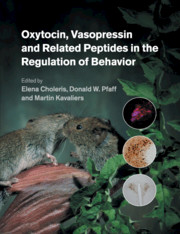12 results
17 - The involvement of oxytocin and vasopressin in fear and anxiety
- from Part III - Human studies
-
-
- Book:
- Oxytocin, Vasopressin and Related Peptides in the Regulation of Behavior
- Published online:
- 05 April 2013
- Print publication:
- 11 April 2013, pp 309-330
-
- Chapter
- Export citation
Index
-
- Book:
- Oxytocin, Vasopressin and Related Peptides in the Regulation of Behavior
- Published online:
- 05 April 2013
- Print publication:
- 11 April 2013, pp 382-393
-
- Chapter
- Export citation
Copyright page
-
- Book:
- Oxytocin, Vasopressin and Related Peptides in the Regulation of Behavior
- Published online:
- 05 April 2013
- Print publication:
- 11 April 2013, pp iv-iv
-
- Chapter
- Export citation
Oxytocin, Vasopressin, and Related Peptides in the Regulation of Behavior - Half title page
-
- Book:
- Oxytocin, Vasopressin and Related Peptides in the Regulation of Behavior
- Published online:
- 05 April 2013
- Print publication:
- 11 April 2013, pp i-ii
-
- Chapter
- Export citation
Part I - Oxytocin and vasopressin systems
-
- Book:
- Oxytocin, Vasopressin and Related Peptides in the Regulation of Behavior
- Published online:
- 05 April 2013
- Print publication:
- 11 April 2013, pp 1-72
-
- Chapter
- Export citation
Part II - Behavioral studies – Comparative approach
-
- Book:
- Oxytocin, Vasopressin and Related Peptides in the Regulation of Behavior
- Published online:
- 05 April 2013
- Print publication:
- 11 April 2013, pp 73-307
-
- Chapter
- Export citation
List of contributors
-
-
- Book:
- Oxytocin, Vasopressin and Related Peptides in the Regulation of Behavior
- Published online:
- 05 April 2013
- Print publication:
- 11 April 2013, pp xi-xiv
-
- Chapter
- Export citation
Contents
-
- Book:
- Oxytocin, Vasopressin and Related Peptides in the Regulation of Behavior
- Published online:
- 05 April 2013
- Print publication:
- 11 April 2013, pp v-vi
-
- Chapter
- Export citation
Oxytocin, Vasopressin, and Related Peptides in the Regulation of Behavior - Title page
-
-
- Book:
- Oxytocin, Vasopressin and Related Peptides in the Regulation of Behavior
- Published online:
- 05 April 2013
- Print publication:
- 11 April 2013, pp iii-iii
-
- Chapter
- Export citation
Part III - Human studies
-
- Book:
- Oxytocin, Vasopressin and Related Peptides in the Regulation of Behavior
- Published online:
- 05 April 2013
- Print publication:
- 11 April 2013, pp 308-381
-
- Chapter
- Export citation
21 - Oxytocin, vasopressin, and related peptides in the regulation of behavior
- from Part III - Human studies
-
-
- Book:
- Oxytocin, Vasopressin and Related Peptides in the Regulation of Behavior
- Published online:
- 05 April 2013
- Print publication:
- 11 April 2013, pp 379-381
-
- Chapter
- Export citation

Oxytocin, Vasopressin and Related Peptides in the Regulation of Behavior
-
- Published online:
- 05 April 2013
- Print publication:
- 11 April 2013



